UK's deep sea mountain life filmed
- Published
Marine biologist Professor J Murray Roberts describes the life found on the slopes of a mountain a kilometre beneath the sea surface
Scientists have sent a remotely operated vehicle to film one of the UK's three undersea mountains, known as seamounts.
The Hebrides Terrace Seamount, off the west coast of Scotland, is higher than Ben Nevis, but its peak is 1,000m beneath the surface.
Prof J Murray Roberts, from Heriot-Watt University, and his colleagues filmed more than 100 species on its slopes.
They published their findings in the open access journal Scientific Reports, external.
Prof Roberts has now shared the footage from the dive exclusively with the BBC.
He and his team used a remotely operated submersible vehicle to explore and film the aquatic mountain slopes.
"These are vast structures in the ocean," Prof Roberts explained to the BBC.
"They're exciting because they grow up through the ocean and have steep sloping sides. [When] the currents hit the sides of the seamount and they stir up nutrients, they become really productive areas."
Prof Roberts and his colleagues watched from a ship-based laboratory while their rover explored the depths.
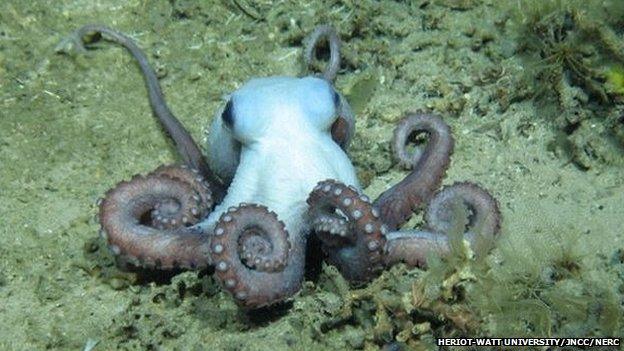
Towards the end of one of the dives, the vehicle had an up-close encounter with an octopus
They identified more than 100 different species, from "really strange" single celled organisms called xenophyophores, which build structures by sticking grains of sand together, to unusual coral species and even an octopus.
Prof Roberts said some of the coral species they saw were unexpected in North Atlantic waters.
"As well as the corals that form little reef patches, we saw things like black corals and bamboo corals," he said.
Some of these corals were providing protection for the egg cases of a very threatened deep sea skate - a relative of the sharks.
Acid oceans
The researchers were particularly interested in recording and monitoring the seamount's corals, because they are so vulnerable to the effects of climate change.
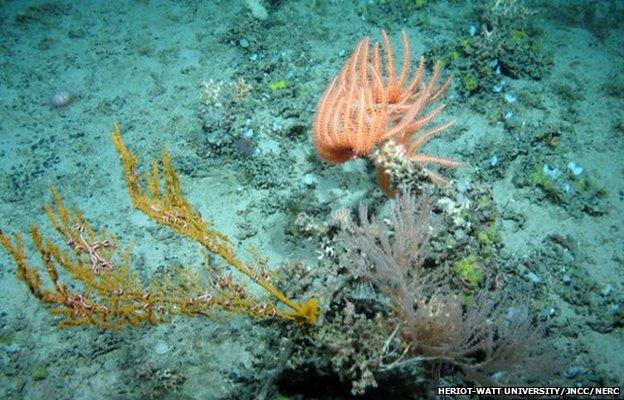
The researchers were surprised by the diversity of coral species they identified
Some of these have been growing there for hundreds and even thousands of years, but forecasts say they could be destroyed before the end of the century by an increasingly acidic ocean environment.
"The rate now at which the oceans are changing is unlike anything they will have experienced in their evolutionary history," said Prof Roberts.
"Carbon dioxide release is changing the chemistry of our oceans, and forecasts in the Atlantic are that the corals will be exposed to more acidic seawater and that their skeletons will dissolve away."
He added that this ocean acidification posed a serious risk to a deep sea ecosystem "that has great value to society", pointing out that some unique chemicals originally extracted from deep sea organisms are now are used in research into treatments for diseases including malaria and cancer.
Dr Carol Turley, from Plymouth Marine Laboratory, said that 96% of the living space on our planet is in the ocean.
"And the majority of that is below 1,000m, but it's still the big unknown area of our planet," she added.
"There is such amazing diversity down there," said Dr Turley. "And fisheries are already moving into the deeper sea, because our surface fisheries are being over-exploited.
"We need to understand the life down there, because its our heritage; we need to look after it for the next generation."
Follow Victoria on Twitter, external
- Published17 January 2014
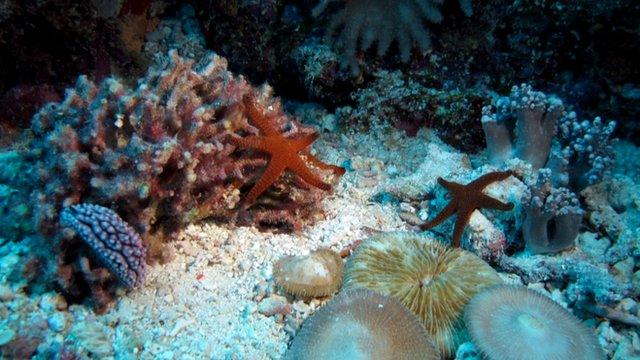
- Published17 June 2014
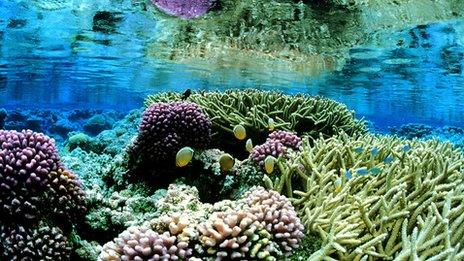
- Published21 August 2013
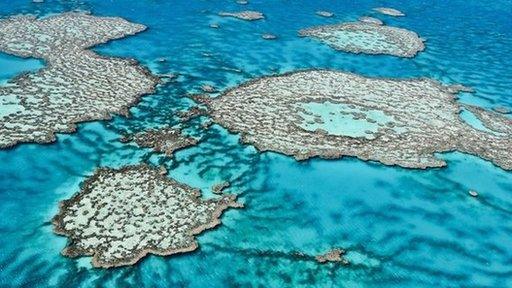
- Published7 December 2011
.jpg)